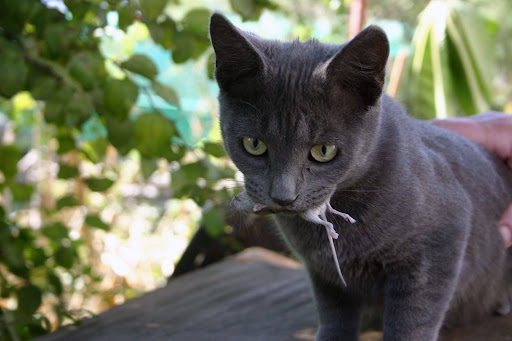If you’re a cat parent in the Vancouver-Portland metro area, you may have wondered, “Do cats get sick from eating mice?”
After all, hunting is an instinct for most felines, and you might have caught your pet proudly presenting you with evidence of their hunting prowess.
While you might not always love your cat’s habit of leaving a dead mouse on your doorstep (or worse, your bed), the idea of your cat snacking on a mouse may seem like “natural behavior,” and perhaps even something that’s beneficial.
Unfortunately, there are hidden risks to consider.
Cats can indeed get sick from eating mice, and the consequences can range from mild discomfort to serious health concerns.
This is why keeping your home pest-free is so important. You don’t like having bugs and rodents wandering around, but it’s equally important to invest in pest control so that your pets are well-protected.
If you’re curious about how mice could affect your cat’s health and how our pest control services can help you avoid problems, read on. We’ll chat about the risks, how to recognize warning signs, and the role a professional pest control service like Natura plays in making your home safer for both you and your furry companions.
Do Cats Get Sick From Eating Mice? The Risks Explained
When your cat catches a mouse, they’re not just consuming a small rodent—they’re potentially ingesting everything that mouse has been exposed to. And trust us, mice aren’t known for their clean eating habits.
First up, there’s the risk of parasites. Mice are often carriers of parasites like roundworms, tapeworms, coccidia, and fleas—all of which can be passed on to cats. The trouble doesn’t stop there. Parasites can lead to ongoing health issues like weight loss, diarrhea, and a dull coat. Talk about a rough deal for what seems like a quick hunting snack!
Then there’s the issue of diseases. Mice sometimes carry harmful bacteria, such as Salmonella, which can cause severe gastrointestinal upset in cats.
Worse yet, rodents can also be hosts for Toxoplasma gondii, a protozoan parasite that causes toxoplasmosis. While the symptoms can vary, they’re particularly harmful to cats with weaker immune systems and can be extremely dangerous when spread to pregnant women.
Rodenticides—poisons used to control mouse populations—are another concern. Should your cat eat a mouse that’s been exposed to rodenticides, they could potentially ingest toxic chemicals. Even small amounts can lead to serious health complications for your feline friend.
Signs Your Cat May Be in Trouble
Your cat isn’t going to come up to you and tell you they’re feeling off after a mouse feast. But they will show signs if something’s wrong.
Be on the lookout for symptoms like vomiting, lethargy, or a loss of appetite. These can all suggest that your cat might have picked up something unwanted from their latest hunt.
If your cat seems to have tummy trouble alongside diarrhea or enlarged pupils, it’s a good idea to visit your local veterinarian ASAP. These could point to exposure to toxins—a problem you don’t want to wait around on.
How to Create a Safer Environment for Your Cat
Here’s the good news —you can take proactive steps to keep mice out of your cat’s reach entirely. Preventing mice from entering your home is absolutely possible, especially when you leave the heavy lifting to an experienced team like Natura Pest Control.
We know the Vancouver-Portland metro area has its fair share of rodent problems, but mouse-proofing your home doesn’t have to feel like a chore.
From sealing small entry points to strategically monitoring risky areas or even using traps, our expert team works to ensure your home stays pest-free. With fewer mice around, your cat will be far less tempted to try their paw at hunting.
Sure, there are DIY solutions out there for controlling mice, but they’re not always effective—and some pest control methods, like traditional poisons, could harm your pet in unintended ways. That’s why getting help from professionals makes all the difference.
At Natura, we use safe, eco-friendly pest control techniques that put your family’s (and your pet’s) safety first. Our tailored pest management plans tackle the root cause of your rodent issues without introducing harsh chemicals into your home.
The result? A calm, rodent-free space where your pets can relax without worry.
Call the Experts to Protect Your Home
So do cats get sick from eating mice? In short, they can. That’s why it’s so important to avoid hinging your pest control efforts simply on having a good “mouser,” and instead, to consider a more effective long-term strategy.
Remember, preventing your cat from eating mice isn’t just about keeping your home rodent-free—it’s an investment in their health and safety. With Natura Pest Control, you’ll gain peace of mind knowing that your home in the Vancouver-Portland metro area is thoroughly protected.
Your cat deserves to chase toy mice, not nibble on the real thing. Get in touch with Natura Pest Control today and enjoy the benefits of a rodent-free environment. Together, we’ll create a home where your pets are happy and healthy. Call now to schedule your consultation!



